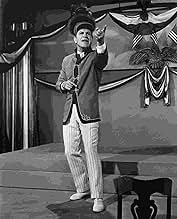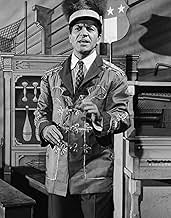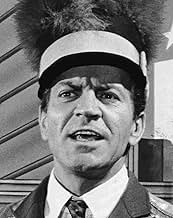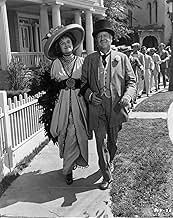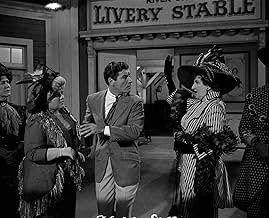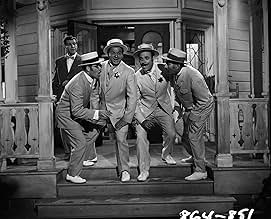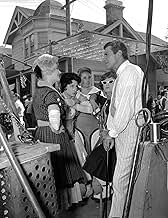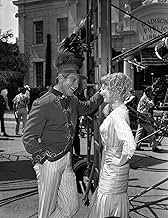CALIFICACIÓN DE IMDb
7.7/10
20 k
TU CALIFICACIÓN
Harold Hill se hace pasar por el líder de una banda de chicos para engañar a la gente del pueblo de Iowa.Harold Hill se hace pasar por el líder de una banda de chicos para engañar a la gente del pueblo de Iowa.Harold Hill se hace pasar por el líder de una banda de chicos para engañar a la gente del pueblo de Iowa.
- Dirección
- Guionistas
- Elenco
- Ganó 1 premio Óscar
- 6 premios ganados y 12 nominaciones en total
Vern Reed
- Jacey Squires
- (as The Buffalo Bills)
Ron Howard
- Winthrop Paroo
- (as Ronny Howard)
Al Shea
- Ewart Dunlop
- (as The Buffalo Bills)
Bill Spangenberg
- Olin Britt
- (as The Buffalo Bills)
Wayne Ward
- Oliver Hix
- (as The Buffalo Bills)
- Dirección
- Guionistas
- Todo el elenco y el equipo
- Producción, taquilla y más en IMDbPro
Opiniones destacadas
This was a very difficult musical, I suspect, for Morton da Costa to direct. To his great credit, it never looks to me like a stage musical; taking his cue from a few famous examples of adaptations done on non-musical films, he has used the entire River City, Iowa, USA town as his stage, moving his mobile cameras wherever the action could best be served. But I suggest "The Music Man" is most important not for its entertainment qualities, which are considerable perhaps, but for its importance as a fantasy-for-the-sake-of-an-idea plot. Without it, we might never have had "Finian's Rainbow", "Chicago" or "City of Angels" for instance. Hollywood's studio tsars, despite their surrealized applying of pseudo-Christian endings to plots, were always very cautious about introducing any "fantasy" element into a film. (Note the lengthy apologia by David Selznick for "Portrait of Jenny", for instance.) In this story, Meredith Wilson used his personal knowledge of the people and ways-of-thinking of Iowa to ground a charming and genial fantasy about music-course salesman Harold Hill firmly within its milieu--one of a group of U.S minds in need of more imagination. The town's kindly folk, in fact, are shown as barely tolerant toward its librarian, who inherited the institution from its elderly compiler; they are suspicious of how Marian Paroo acquired the stock, and suspicious of her desire to teach their young minds to think for themselves. Enter Professor Hill--to change the lives of the almost charming but repressed early twentieth-century denizens forever. The basic plot is very simple to state. Professor Hill comes to towns, sells the town's citizens on the idea of starting a boy's band, and then skips out before they can ever perform. Here, he is brought to the point of leading his troops, trained by his "think system", in a concert; and the townsfolk are enthralled by hearing their sons play. This simple tale starred Robert Preston as the wily city-bred Hill, Shirley
Jones as the lovely but doubting 'Marian the Librarian', Pert Kelton as her mother, Buddy Hackett as his fine friend, Paul Ford and Hermione Gingold as the pretentious Mayor and his wife, plus many citizens of the town young and old, Harry Hickox as the envious rival who exposes Hill and the Buffalo Bills singing quartet. Well-known songs in this sprightly US romp include, "Till There Was You", "Somethin' Special", "Goodnight My Someone", "Marian the Librarian" and "Trouble", among others. In the film, the leads are award caliber, everyone else from Ronnie Howard to Susan Luckey to the quartet do very well. Marion Hargrove adapted Wilson's libretto and songs written by Wilson and Franklin Lacey. The cinematography by Robert Burks was vivid and stylishly old-fashioned. Paul Groesse did the art direction, with set decorations being supplied by George James Hopkins and his staff. The very elaborate costumes were the work of the brilliant designer Dorothy Jeakins. This is a sense of life film written by, about and for non-practicing Christians of the last century that was mounted somehow in 1962, as an homage to a simpler and more optimistic time. We can all be grateful it was; it is a great deal of fun and its ending is a happy part of the fantasy, which needs to be seen to be appreciated.
Jones as the lovely but doubting 'Marian the Librarian', Pert Kelton as her mother, Buddy Hackett as his fine friend, Paul Ford and Hermione Gingold as the pretentious Mayor and his wife, plus many citizens of the town young and old, Harry Hickox as the envious rival who exposes Hill and the Buffalo Bills singing quartet. Well-known songs in this sprightly US romp include, "Till There Was You", "Somethin' Special", "Goodnight My Someone", "Marian the Librarian" and "Trouble", among others. In the film, the leads are award caliber, everyone else from Ronnie Howard to Susan Luckey to the quartet do very well. Marion Hargrove adapted Wilson's libretto and songs written by Wilson and Franklin Lacey. The cinematography by Robert Burks was vivid and stylishly old-fashioned. Paul Groesse did the art direction, with set decorations being supplied by George James Hopkins and his staff. The very elaborate costumes were the work of the brilliant designer Dorothy Jeakins. This is a sense of life film written by, about and for non-practicing Christians of the last century that was mounted somehow in 1962, as an homage to a simpler and more optimistic time. We can all be grateful it was; it is a great deal of fun and its ending is a happy part of the fantasy, which needs to be seen to be appreciated.
bright, fun, colorful, unforgettable songs, likeable characters, great choreography, true to the time period, and i'd like to see anyone try to find an actor blend so naturally into a character as robert preston.
10jhclues
It's early in the Twentieth Century, and there's trouble, my friends, in River City. Iowa, that is, in this delightful adaptation of Meredith Wilson's long running Broadway musical, `The Music Man,' directed by Morton DaCosta and starring Robert Preston as the fast-talking, fleet-footed traveling salesman, Harold Hill. `Professor Harold Hill,' as he calls himself this time around, is in the business of selling band instruments and uniforms, all with the guarantee that he will teach the youngsters of the parents who fork over the cash for his wares how to play. There's only one problem, and it's the fact that -- as one of his fellow competitors puts it-- `He don't know one note from another!' Alas, can it be the con is on?
When he jumps train in River City to escape the wrath of an angry gathering of his peers, whom he has `Given a black eye' to in the territory, thanks to his dubious business practices, he sets about plying his trade on the good folks of middle America. But right out of the chute, he runs into some problems: The Mayor of River City, George Shinn (Paul Ford) wants his credentials, the lovely young local piano teacher and librarian, Marion (Shirley Jones), has her doubts about him, and he lacks an `angle,' something to convince the local citizenry of the need for a `boys band' to get them out of the trouble they're in-- even if there isn't any until he `creates' it.
One of his problems is solved when he runs into Marcellus Washburn (Buddy Hackett), a former shill of his, who mentions the new billiard table that just arrived in town. And that's all the Professor needs; because now they've got trouble, `With a capital T' that rhymes with P' and that stands for Pool'!' With that, he's up and running and he's got everything timed, right down to the `Last wave of the conductor's hand on the last train out of town.' Yee-gods and great honk! River City, Iowa, is about to have their very own boy's band.
Robert Preston gives the most memorable performance of his career as Hill, the silver-tongued salesman who can palaver past postulated proffered predicaments quicker'n an eggheaded egret's emblematized egression. It's just a matter of charm, style and timing, and Preston imbues Hill with em all, and more. He brings a mesmerizing presence to the screen in this role that is absolutely perfect; Preston IS Harold Hill, and he makes him his own in such a way that it's impossible to visualize anyone else in the role. It certainly gave Preston a chance to demonstrate his amazing versatility, and he really made the most of it, carving out a niche for himself in cinematic history.
The beautiful and talented Shirley Jones is terrific, as well, as `Marion the Librarian,' the young woman with a heart of gold who becomes a formidable opponent for Hill as he tries to charm his way past her suspicions of him. Jones personifies everything that is pure, moral and good, without being prudish, and it makes Marion a truly endearing character. And, like Preston, her performance is so good it's impossible to picture anyone else in the part. She's simply magnificent.
The made-to-order supporting cast includes a very young Ron Howard, unforgettable as Winthrop Paroo, Marion's little brother, Hermione Gingold (Eulalie Mackechnie Shinn), Pert Kelton (Mrs. Paroo), Monique Vermont (Amaryllis), Susan Luckey (Zaneeta), Timmy Everett (Tommy Djilas), Harry Hickox (Charlie) and Mary Wickes (Mrs. Squires). Featuring a number of memorable songs, including `76 Trombones,' `Till There Was You,' `Gary, Indiana' and of course the catchy `Trouble In River City' number, `The Music Man' is an uplifting, totally transporting film that makes the world seem like a pretty good place after all. This is the `Good Old Days' the way we'd like to think they really were, and it's all courtesy of the magic of the movies. I rate this one 10/10.
When he jumps train in River City to escape the wrath of an angry gathering of his peers, whom he has `Given a black eye' to in the territory, thanks to his dubious business practices, he sets about plying his trade on the good folks of middle America. But right out of the chute, he runs into some problems: The Mayor of River City, George Shinn (Paul Ford) wants his credentials, the lovely young local piano teacher and librarian, Marion (Shirley Jones), has her doubts about him, and he lacks an `angle,' something to convince the local citizenry of the need for a `boys band' to get them out of the trouble they're in-- even if there isn't any until he `creates' it.
One of his problems is solved when he runs into Marcellus Washburn (Buddy Hackett), a former shill of his, who mentions the new billiard table that just arrived in town. And that's all the Professor needs; because now they've got trouble, `With a capital T' that rhymes with P' and that stands for Pool'!' With that, he's up and running and he's got everything timed, right down to the `Last wave of the conductor's hand on the last train out of town.' Yee-gods and great honk! River City, Iowa, is about to have their very own boy's band.
Robert Preston gives the most memorable performance of his career as Hill, the silver-tongued salesman who can palaver past postulated proffered predicaments quicker'n an eggheaded egret's emblematized egression. It's just a matter of charm, style and timing, and Preston imbues Hill with em all, and more. He brings a mesmerizing presence to the screen in this role that is absolutely perfect; Preston IS Harold Hill, and he makes him his own in such a way that it's impossible to visualize anyone else in the role. It certainly gave Preston a chance to demonstrate his amazing versatility, and he really made the most of it, carving out a niche for himself in cinematic history.
The beautiful and talented Shirley Jones is terrific, as well, as `Marion the Librarian,' the young woman with a heart of gold who becomes a formidable opponent for Hill as he tries to charm his way past her suspicions of him. Jones personifies everything that is pure, moral and good, without being prudish, and it makes Marion a truly endearing character. And, like Preston, her performance is so good it's impossible to picture anyone else in the part. She's simply magnificent.
The made-to-order supporting cast includes a very young Ron Howard, unforgettable as Winthrop Paroo, Marion's little brother, Hermione Gingold (Eulalie Mackechnie Shinn), Pert Kelton (Mrs. Paroo), Monique Vermont (Amaryllis), Susan Luckey (Zaneeta), Timmy Everett (Tommy Djilas), Harry Hickox (Charlie) and Mary Wickes (Mrs. Squires). Featuring a number of memorable songs, including `76 Trombones,' `Till There Was You,' `Gary, Indiana' and of course the catchy `Trouble In River City' number, `The Music Man' is an uplifting, totally transporting film that makes the world seem like a pretty good place after all. This is the `Good Old Days' the way we'd like to think they really were, and it's all courtesy of the magic of the movies. I rate this one 10/10.
The Music Man is a musical film that was done right and which, if anything, improves on its well regarded source material. It ranks up there with the all-time great musicals of Hollywood's golden age (and such British marvels such as "Evergreen," which starred the incomparable Jessie Matthews.
This movie has it all - wonderful music, a fine script, good production values and a top cast. What makes it really special is Robert Preston's tour-de-force performance. His performance is, quite simply, one of the most memorably great performances in the history of film.
It's one of those benchmark performances that must make any other actor who takes the role shake in their boots, for as long as the memory of Robert Preston as Prof. Hill exists all others will be compared against him and, likely, found lacking.
The rest of the cast is superior. I especially love Pert Kelton as Marian the Librarian's mother. Kelton was the original Alice on the classic "The Honeymooners" (she played Alice's mother later on in the series) and she had incredible comic timing. She reminds me of a combination of Ethel Merman, with her brassy voice and larger-than-life presence, and the comic genius of the great Patsy Kelly. It's a shame Kelton was not put to better use in the movies. She was a natural.
And then there is Shirley Jones. Lovely to look at and wonderful to hear and a good enough actor to keep up with Preston.
Buddy Hackett usually annoyed me but he's perfect as Prof. Hill's sidekick and his "Shafoofie" (sp?) number is a blast.
Funniest scene - Grecian Urns.
A splendid movie and one of the last great musicals. They truly don't make 'em like that anymore.
This movie has it all - wonderful music, a fine script, good production values and a top cast. What makes it really special is Robert Preston's tour-de-force performance. His performance is, quite simply, one of the most memorably great performances in the history of film.
It's one of those benchmark performances that must make any other actor who takes the role shake in their boots, for as long as the memory of Robert Preston as Prof. Hill exists all others will be compared against him and, likely, found lacking.
The rest of the cast is superior. I especially love Pert Kelton as Marian the Librarian's mother. Kelton was the original Alice on the classic "The Honeymooners" (she played Alice's mother later on in the series) and she had incredible comic timing. She reminds me of a combination of Ethel Merman, with her brassy voice and larger-than-life presence, and the comic genius of the great Patsy Kelly. It's a shame Kelton was not put to better use in the movies. She was a natural.
And then there is Shirley Jones. Lovely to look at and wonderful to hear and a good enough actor to keep up with Preston.
Buddy Hackett usually annoyed me but he's perfect as Prof. Hill's sidekick and his "Shafoofie" (sp?) number is a blast.
Funniest scene - Grecian Urns.
A splendid movie and one of the last great musicals. They truly don't make 'em like that anymore.
I first saw "The Music Man" on its first run in 1962. I just saw it again last night on cable. If anything, I enjoyed it more last night. I think that your belief in "fairy tales" such as this only grows with the passing of the years. Preston's performance is so near-perfect that the viewer starts to believe his line of corn-fed BS. The knowledge of what Ron Howard has become enhances the enjoyment of his fine work here. It's funny, magical and a musical treat to the ears!!
¿Sabías que…?
- TriviaThe two songs "76 Trombones" and "Good Night My Someone" are the same tune, played in different tempos. Meredith Willson used this technique to present a masculine and feminine slant on the events surrounding Harold Hill's arrival in River City and his budding relationship with Marian.
- ErroresAs Harold makes his very first walk down Main Street after getting off the train, the hills in the background are at the far eastern end of the Santa Monica Mountains. Iowa is famously flat.
- Citas
Marian Paroo: No, please, not tonight. Maybe tomorrow.
Harold Hill: Oh, my dear little librarian. You pile up enough tomorrows, and you'll find you've collected nothing but a lot of empty yesterdays. I don't know about you, but I'd like to make today worth remembering.
Marian Paroo: Oh, so would I.
- Créditos curiososThe closing credits appear in the style of a Broadway show's curtain call. First the minor characters are shown with the performers' names. The credits then progress through the cast ending with the lead.
- Bandas sonorasMain Title
(1957) (uncredited)
Music and Lyrics by Meredith Willson
Performed by Ray Heindorf and the Warner Bros. Studio Orchestra
Selecciones populares
Inicia sesión para calificar y agrega a la lista de videos para obtener recomendaciones personalizadas
Detalles
- Fecha de lanzamiento
- País de origen
- Idioma
- También se conoce como
- The Music Man
- Locaciones de filmación
- Productora
- Ver más créditos de la compañía en IMDbPro
Taquilla
- Presupuesto
- USD 4,240,000 (estimado)
- Tiempo de ejecución2 horas 31 minutos
- Color
- Relación de aspecto
- 2.35 : 1
Contribuir a esta página
Sugiere una edición o agrega el contenido que falta


